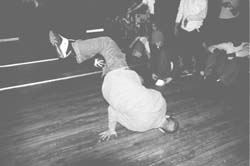

Hip-Hop
Conf. Gets Political
BY ADRIAN LEUNG
This weekend, Oberlin hosts another Hip-Hop Conference. Although the
 (photo by Steve Freed) |
Hip-Hop Conference is becoming an annual
event, organizers of this weekend’s performances and workshops advocate
that this conference is significantly different in terms of politics
than conferences of previous years.
Some immediately note the emphasis on education, as opposed to performance,
within this year’s conference. Organizer and junior NiJa Whitson said,
“One immediately thinks of music when hip-hop comes to mind and we hope
to show that there is more to it than that. When you connect hip-hop
with the black community and you trace the historical stereotype of
blacks only being capable of simplicity and lack of intellect, it is
easy to see why hip-hop is perceived that way. This conference is trying
to show that hip-hop isn’t simple and is highly intelligent.”
Among this weekend’s activities are a breakdancing workshop, a DJ battle,
a hip-hop film, panel discussions, performances and lectures.
Sophomore Anika Adilifu, who worked on last year’s conference, recognized
that one major change is the people on the organization committee. “I
think that the main difference is that the organization committee is
made up of new members as opposed to the conference last year. I think
this is significant because last year’s organizers are also interested
in the presence of hip-hop on this campus. But I’m glad they’re doing
it, and I’m supportive of it 100 percent,” she said.
Sophomore Jerome Padilla, who worked on last year’s conference as well
as this year’s, said the content of the conference also differed. “Last
year, people, we brought mainstream people, which represented what the
appeal is to the mainstream. Last year, we tried to bring in hip-hop
in its mass appeal form, with well-known acts. The Rock Steady Crew
and the Fifth Platoon are still rather well known, but they’re less
commercial. I don’t want to de-emphasize the importance of mainstream
hip-hop –– it plays a large role in the youth. But this year, we’re
trying to present the talent that these people live and practice everyday
in hip-hop’s more expressive form. We’re focusing on the talent that
is apparent with hip-hop and it’s manifestation in everyday life.”
Whitson made it clear that the absence of commercialized hip-hop culture
was purposeful. “This [conference] is also different because of the
conscious decision to not bring large mainstream performers. We have
noted the commercialization of hip-hop culture and wanted to provide
a space for artists to come who weren’t necessarily a part of it. We
wanted to give some attention to the artists who are still participating
in the hip-hop community without getting the mainstream bucks for it.”
Junior Yvonne O. Etaghene will be a panelist on a discussion entitled,
“Hip-Hop in Oberlin: What’s Really the Deal?” Etaghene shared her interpretation
of the Oberlin scene. “I think hip-hop at Oberlin is kind of distorted.
I don’t think it’s a representation of what hip-hop is outside of Oberlin,
and hip-hop outside isn’t a representation of what it originally was
— non-misogynistic, semi-politicized. Even though hip-hop is distorted
and skewed from what is outside Oberlin, it’s also reflective of things
outside of Oberlin, being white-dominated and romanticized by white
people,” she said.
Etaghene also shared her thoughts on hip-hop’s original form. She said,
“Hip-hop started as a protest genre, about people not being fed, getting
harassed by the police, being jobless.”
Whitson said she was dissatisfied with Oberlin’s hip-hop scene. “I believe
that because Oberlin is so ‘everybody can be a part of everything’ most
people who consider themselves a part of the hip-hop community don’t
care to mention the black community it came from. People are so quick
to go to a hip-hop show or concert but don’t say hello to a black woman
or man when they walk down the street. The hip-hop community here is
usually considered to be made up of five or six individuals which is
nonsense. Hip-hop is bigger than any one person and it saddens me to
think that people here use it as a tool for recognition, to be ‘down’
or to be ‘cool.’ Stop appropriating me and start appreciating me,” Whitson
said.
Adilifu did not think this conference was thematically different from
last year’s. She said, “I don’t think there are differences. I think
this is a continuation of an effort to have a celebration of hip-hop
in the community, on-campus and open to the community at large, not
just the College students. I don’t think it’s necessary to try and specify
which community hip-hop influences, or is generated from, most predominantly.
The issue is a human issue, not a race issue.”
First-year Vida Vazquez was hopeful that the conference will alter people’s
perspectives of hip-hop. “I hope that it will make people think more,
regarding hip-hop, less as a consumer product, more as art and a social
and political vehicle. And of course I hope people have a good time,
feel community,” she said.
Whitson said the conference will empower the community, but remains
wary of what she doesn’t want people to take from the conference. “I
don’t want people coming because hip-hop is ‘cool.’ I don’t want people
coming because they want to observe the ‘spectacle.’ This conference
is bigger than concerts and entertainment and I don’t want people coming
because that is all they hope to get out of it.”
![]()
Student Health Contractor Goes Bankrupt
Panel Discusses White Privilege
Revolving Wheels; Evolving Philosophy
DS3 Line To Make Resnet Faster
Elyria Store Does Wicked Awesome Airbrushing
Dining Proposal Review Postponed Until After Break